Some great ideas I’ve come across
-
A combination of some data and an intense desire to find a solution doesn’t mean the solution exists in the data.
-
How do you know you’re confused?
-
If something bothers you, how are you designing your life to fix it?
Find more things worth reading in the curated section.
If you want a dose of new ideas designed to make you smarter, subscribe to the Idea Muse. It’s one new idea every few weeks designed to make you smarter.
My favourite post
Things I want to learn more about
This is an incomplete list of everything I want to learn more about.
-
Obscure fields and industries
For example, chicken sexers: A highly specialized job in the poultry industry for figuring out the sex of newborn chicks - which decides their future. Being good at this is important to sort the egg-laying hens from the meat.
-
Antifragility, optionality, and implementing these ideas in your life.
-
How to see like an artist, and hear like a musician
I learned to draw ages ago. All the faces I drew always looked the same. Last year, I picked up a book on drawing, and it changed everything I knew about drawing. The thing is, I wasn’t drawing by looking at things - I was drawing using my mental representation of things. No building looks like a cuboid, even though it is one. No two faces look exactly the same. When I learned how to see them, I could draw them better.
-
Engineering Design Practices, specially in architecture and medicine.
Example: Designing an intricate model of a building isn’t the same as scaling it up. Volume and area scale up non linearly, which means something that looks great in miniature-world might collapse in full-blown-scale. How do architects and civil engineers balance creativity and practicality?
-
Applying Theory of Constraints
-
What are the learning loops in your field? What feedback loops are in place to show you whether you did the right or wrong thing?
-
How does design of tools affect their usage. What are existing tools for thought?
-
Everything about analogies
-
Things only people working in a specific profession know. I’d love to hear interesting insights from your profession.
Example: mise en place in cooking. Cooking something well requires things are under the fire a specific amount of time. If you’re not ready when it’s time to put something in the pan, your entire system collapses and you have to play catch up. Mise en place, or preparing ingredients before you start cooking is a common practice in kitchens - it helps avoid this catching up problem. So interesting!
-
In line with the above, how do specific industries work? What makes agriculture different from, say, tech consulting? In what ways are they similar? Where can I read more about how an industry works?
-
How to think about Complex Systems. How do cities work? How does progress occur? Can cities store information that none of the citizens have in their heads?
How ant and bee colonies work? How much can be extrapolated up to cities?
-
How does emergence work? It’s a lot like magic.
-
Coordination & Cooperation problems. Why do most people default to defecting? Without external enforcement, what makes someone default to cooperating?
-
How we handled macro-rebuilding in the 1910s and 1950s.
If you want to say something about any of these, contact me!

The most popular posts
-
Things I learnt from a Senior Software Engineer
-
If Sapiens were a blog post
-
How Unix Works: Become a Better Software Engineer
-
How Not to Be Afraid of Git Anymore
Find all posts in the Blog section!




